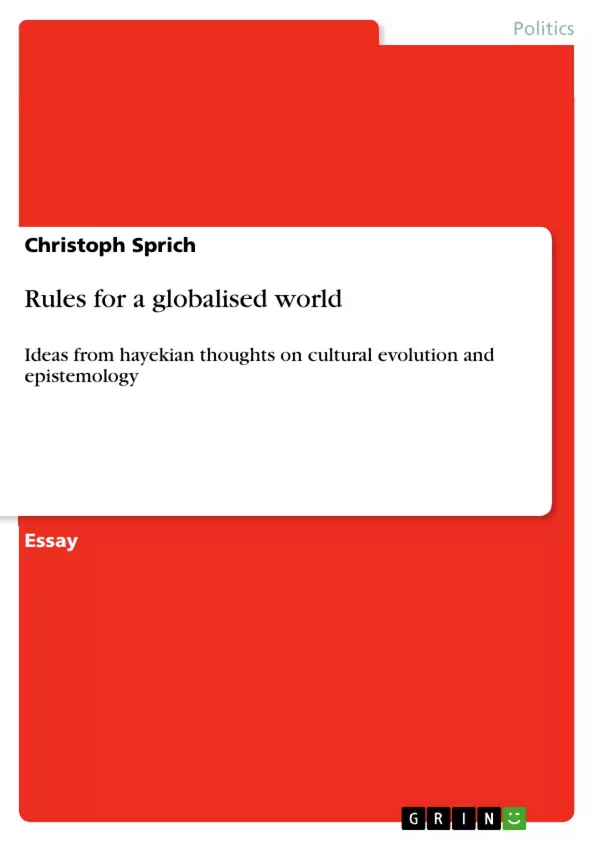Hayek emphasises two requirements for an international order. Firstly the development of a framework of purpose-independent abstract rules and secondly the fields where true agreement between different kinds of 'weltanschauung' could be obtained. By regarding his first argument, in search of the origin of social rules, a critical examination of Hayek's theory of cultural evolution can show that in general the evolvement of rules needs to be guided by constraining rules of a higher level and that in the special case of rules for an international order such meta-rules could not be presupposed. Concerning the second requirement, the fields in which true agreement between cultures could be reached, his own epistemology can give us precious indications to the core of the problem. Hayek's epistemological argument of the boundedness of the human mind has shown us that intercultural agreement concerning specific objects could fail because of the absence of overlapping cognitive structures concerning the basis of those rules. The case of protected domains has served as such an example. Such problems could be theoretically examined by the new research program of the 'Cultural Economics' which combines the knowledge of a diversity of social sciences.
Inhaltsverzeichnis (Table of Contents)
- FOREWORD
- INTRODUCTION
- HAYEK'S TWO ARGUMENTS ON GLOBAL ORDER
- ABSTRACT RULES FOR A GLOBALISED WORLD
- Types and Origin of Rules
- Cultural Evolution in a Globalised World
- The Meaning of Abstract Rules for an International Order
- DOMAINS OF AGREEMENT AS A BASIS FOR FORMAL RULES
- The Hayekian Epistemology
- The Epistemolocical Significance Rules
- Cultural Economics and Domains of Agreement
- CONCLUSION
Zielsetzung und Themenschwerpunkte (Objectives and Key Themes)
This essay explores the origins and role of abstract rules for peaceful interaction between culturally diverse individuals, particularly in a globalized world. It examines Hayek's theories of cultural evolution and epistemology to understand the importance of abstract rules for establishing a global order based on freedom and mutual benefit. The main themes of the essay are: * **Cultural Evolution and the Role of Abstract Rules:** The essay analyzes how abstract rules emerge and evolve within societies, emphasizing their importance for international order. * **Protected Domains and the Importance of Private Property:** The essay examines the concept of protected domains, particularly private property, and its essential role in fostering a framework for abstract rules. * **The Hayekian Epistemology and Intercultural Agreement:** The essay delves into Hayek's epistemological arguments, highlighting the challenges and possibilities of achieving intercultural agreement on abstract rules. * **Cultural Economics and the Potential for Global Order:** The essay explores the potential of the emerging field of cultural economics to provide a theoretical framework for understanding and addressing the challenges of global order.Zusammenfassung der Kapitel (Chapter Summaries)
- **Foreword:** The author introduces the essay, noting its origins as a winning submission for the Mont Pelerin Society's essay contest in 2004. The author reflects on the continued relevance of Hayek's ideas in the context of global economic challenges.
- **Introduction:** The essay outlines the central question regarding the origins and role of abstract rules for peaceful interaction between culturally diverse individuals in a globalized world. The author highlights the importance of Hayek's theories in addressing these issues.
- **Hayek's Two Arguments on Global Order:** The essay introduces Hayek's two main arguments for an international order: the development of purpose-independent abstract rules and the identification of fields where true agreement between cultures can be achieved.
- **Abstract Rules for a Globalized World:** This section explores the types and origins of rules, discussing the role of cultural evolution in shaping rules for a globalized world. The essay argues that abstract rules for an international order must be guided by higher-level meta-rules.
- **Domains of Agreement as a Basis for Formal Rules:** The essay examines Hayek's epistemology, arguing that intercultural agreement on specific rules can be hindered by the absence of overlapping cognitive structures. The essay highlights the example of protected domains to illustrate these challenges.
Schlüsselwörter (Keywords)
This essay focuses on the key concepts of cultural evolution, abstract rules, private property, protected domains, epistemology, intercultural agreement, and cultural economics, examining their role in the development of a global order based on freedom and mutual benefit. The essay explores the theoretical foundations for achieving a peaceful and prosperous globalized world, drawing from Hayek's insightful analysis of individual, societal, and international interactions.Frequently Asked Questions
What are Hayek's two requirements for a global order?
Hayek emphasizes the development of purpose-independent abstract rules and identifying fields where true agreement between different cultures can be reached.
What is the role of "Cultural Evolution" in Hayek's theory?
It describes how social rules emerge and evolve, though the essay argues that international rules need higher-level meta-rules to function globally.
Why can intercultural agreements fail according to Hayek's epistemology?
Failure can occur due to the absence of overlapping cognitive structures between cultures regarding the basis of social rules.
What is the significance of "protected domains"?
Protected domains, such as private property, are essential frameworks that allow for peaceful interaction in a globalized world.
How does "Cultural Economics" contribute to global order?
This research program combines social sciences to theoretically examine problems of intercultural agreement and rule development.
- Citation du texte
- Dr. rer. pol. Christoph Sprich (Auteur), 2004, Rules for a globalised world, Munich, GRIN Verlag, https://www.grin.com/document/116232



